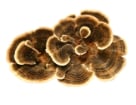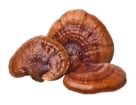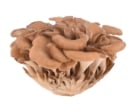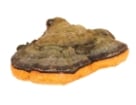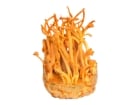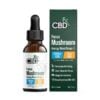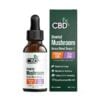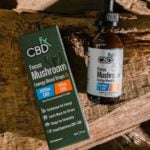
Medically reviewed by
Dr. John Rackham
Written by Clay Steakley
Updated on February 24th, 2022
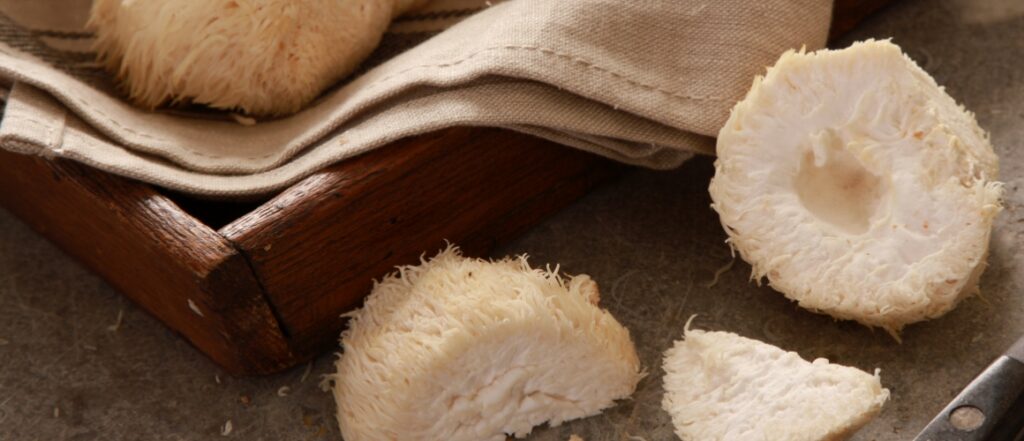
Few medicinal mushrooms command as much respect, or as many imaginative names, as lion’s mane. Used for centuries across Asia in the belief that it helps with cognitive function, focus, longevity and overall wellness, this fascinating fungus is still surprising us today.
Also known as hou tou gu (monkey head mushroom), bearded tooth, satyr’s beard, and even bearded hedgehog, the lion’s mane mushroom gets its many names from its shaggy, pom-pom appearance.
Originally used both in medicine and food recipes across most of Asia, lion’s mane has in recent decades been embraced around the globe. Today, you can find this species of mushroom nearly everywhere, from coffee supplements and capsules to tea and, yes, even CBD products.
What is it about this fluffy fungus that has captured peoples’ imagination for such a very long time? Is there any truth to traditional belief in its power to lengthen your lifespan or modern marketing hype about lion’s mane’s potential to rewire your brain?
As with so many things, the truth lies somewhere in the middle.

Know Your Mushroom: Lion’s Mane Mushroom History
In ancient times, this marvelous mushroom was used by royalty to balance Qi, or life force, and to protect all the major organs. Buddhist monks drank lion’s mane tea to enhance their focus in meditation — in fact, the Japanese name for these mushrooms, yamabushitake, meaning “those who sleep in the mountains,” may come from the ascetic Yamabushi monks who wear a kind of pom-pom on formal garments that resembles the mushroom.
Asia wasn’t alone in its appreciation of this marvelous mushroom. At the very least, indigenous North Americans and a few European cultures were also aware of lion’s mane mushroom benefits.
As advances were made in traditional medicine, the use of the mushroom hericium erinaceus expanded and the potential of lion’s mane began to make itself known. Lion’s mane mushrooms are packed with protein, potassium, and vitamin D, as well as polysaccharides like beta-glucan.
Gradually, western science has begun to reevaluate the wisdom found in traditional medicine. Today, researchers have learned much of what makes the lion’s mane so useful, and why it works as well as it does.
Lion’s Mane Mushroom Benefits
Lion’s mane mushroom extract has a wealth of health benefits for the mind and body.
Note: These benefits have largely been studied only in animals or in very small human studies. It is important to discuss any supplement use with your doctor and do not stop taking your medication without consulting a health professional.

Lion’s Mane as Anti-inflammatory
Studies have shown that lion’s mane might be effective in fighting acute, temporary inflammation and even chronic inflammation illnesses, like ulcerative colitis[1]. The studies have largely been done on mice, however, and the definitive science about results in humans is as-yet unclear.
Lion’s mane has been used for centuries to protect the stomach from ulcers and to promote overall gut health, as well as to fight tissue inflammation.

Lion’s Mane as Antioxidant
This shaggy sporoid is also a powerful antioxidant. In fact, lion’s mane has been found to be one of the most powerful antioxidant mushrooms[2].
You may already know that we love antioxidants here at CBDfx. Their power to protect our cells, skin, organs, and even DNA from oxidative stress and damage is why we’re always looking for natural antioxidants to add to our formulas.
It’s believed that lion’s mane mushroom even boosts our immune function through its antioxidant and anti-inflammatory properties, fighting oxidation and promoting the growth of immune-boosting gut bacteria.

Lion’s Mane as Adaptogen
When it comes to combining lion’s mane with CBD, it’s the adaptogenic properties of the mushroom that we look to. What does that mean?
Adaptogens[3] are natural compounds that can help your body manage and adapt to stress, including biological, chemical, and physical stress. They were first named by the Russian scientist Nikolai Lazarev, who was looking for ways to increase vitality in athletes and soldiers.
Lion’s mane has long been looked to for help managing stress and anxiety, as well as boosting creativity and fighting depression.

Lion’s Mane as Nootropic
One reason for the reputation of lion’s mane mushrooms as a brain booster lies in its potential as a nootropic that focuses and increases cognitive function. There are a number of ways this seems to work, including stimulating growth and repair of nervous system cells, fighting brain cell inflammation, and more.
Lion’s mane, in particular, has been studied for its potential to reverse damage to those crucial neurotransmitters serotonin and dopamine[4]. Lion’s mane has even been studied as a possible future treatment for Alzheimer’s Disease[5] and protection against dementia.[6]
Keep in mind that all these studies are ongoing or haven’t reached human trials, and we don’t make any medical claims about lion’s mane, CBD, or any other natural supplement’s ability to treat serious illnesses.
That said, we know that lion’s mane is the most well-known nootropic mushroom, and people around the world have looked to its potential to improve all aspects of cognitive health, from focus to memory.
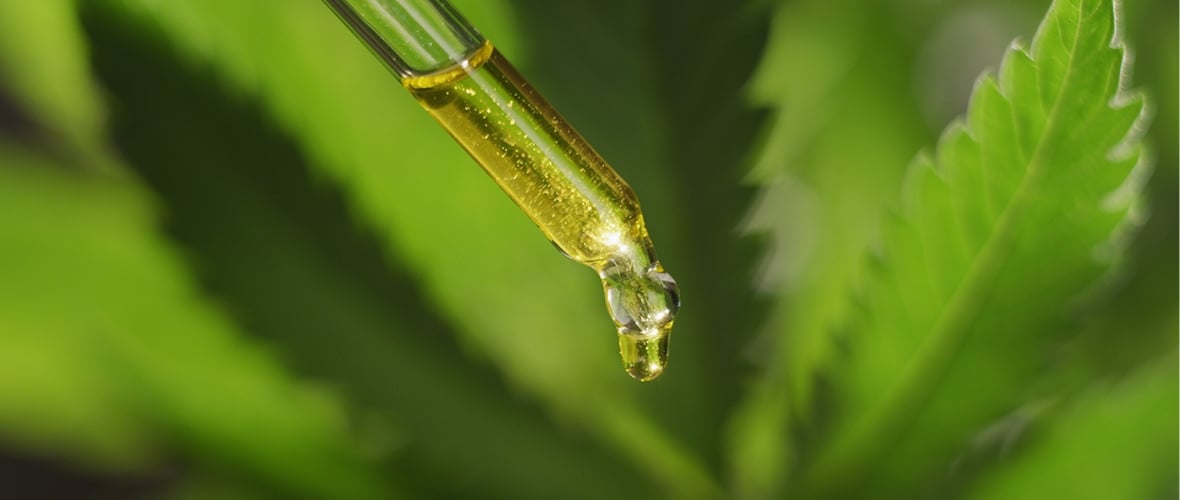
Lion’s Mane and CBD
So, why are we talking about mushrooms on our CBD blog? Simple. CBD and mushrooms, like lion’s mane, can be combined to amazing therapeutic effect (which is why we’ve created an entire line of CBD Mushroom products!). To understand why, we need to know a bit about what CBD is and how it works.
CBD is short for cannabidiol, one of hundreds of compounds found in the cannabis plant known as cannabinoids. CBD and other cannabinoids, like CBG, CBC, and CBN interact with receptors in a system in our bodies known as the endocannabinoid system.
The endocannabinoid system is integrated with our central and peripheral nervous systems, as well as tissues and systems in our body that regulate mood, sleep, immune response, and more. When a cannabinoid interacts with a receptor in the endocannabinoid system, it imparts therapeutic effects.
Let’s look at how lion’s mane and CBD interact in our new product, Focus Mushroom + CBD Drops: CBG Energy Blend.
There are a few major ingredients and processes that help us make the most of lion’s mane in this product.
- Broad spectrum CBD is CBD oil that has filtered out the legally allowed trace amounts of THC, but retained most of the other valuable cannabinoids present in cannabis hemp, including CBD, CBG, terpenes, and flavonoids. When these are all present, the conditions are right for the Entourage Effect, which is a synergistic effect where each element present in the product modifies the effects of other elements, while also contributing to a more powerful overall experience.
- CBG, also known as “the mother of all cannabinoids,” has been found to create what people describe as an energizing and focusing effect when combined with CBD and other supplements.
- Lion’s mane is the nootropic and adaptogenic star of this mushroom formula. The ability of lion’s mane to modify stress response while boosting cognitive function enhances focusing power. Plus, this mushroom provides a big protein and nutrient boost.
- Other adaptogens, cordyceps mushrooms and chaga mushrooms, contribute their own stress-mitigating powers, as well as protein, nutrients, and immune support.
When all these elements come together, the mushrooms and cannabinoids contribute to an incredibly balancing and energizing experience.
Psilocybin? Lion’s Mane vs “Magic” Mushrooms
Lion’s mane is not a psychedelic fungus. This mushroom is good to cook, if you have the right recipe, but it doesn’t possess the psychoactive, hallucinatory properties of “magic” mushrooms or “‘shrooms.” Similarly, CBD products are not psychoactive and do not cause a euphoric experience.
In short, all the ingredients we use, from CBD to mushrooms like lion’s mane, are chosen for their wellness benefits alone.
Lion’s Mane, CBD, and Your Health
We’ve only hit the tip of the iceberg discussing the amazing properties of lion’s mane. We haven’t touched on its potential to reduce risk of heart disease[7], manage diabetes[8], and possibly fight cancer[9].
You know that the benefits of natural supplements and traditional medicines are often exaggerated, especially by the companies who sell them. But centuries of use around the globe and decades of documented scientific research show that lion’s mane has real potential to help our overall health and wellness.
We love adaptogenic mushrooms and nootropic mushrooms, like lion’s mane, and we think they make truly effective additions to our formulas. Try our mushroom products for yourself and see!
Wondering where to start with lion’s mane mushrooms? Try our Focus Mushroom + CBD Drops: CBG Energy Blend!
- Mingming Qin, International Journal of Medicinal Mushrooms. “Anti-Inflammatory Effects of Ethanol Extract of Lion’s Mane Medicinal Mushroom, Hericium erinaceus (Agaricomycetes), in Mice with Ulcerative Colitis.” https://pubmed.ncbi.nlm.nih.gov/27481156/. 2016.
- Noorlidah Abdullah et al, Hindawi. “Evaluation of Selected Culinary-Medicinal Mushrooms for Antioxidant and ACE Inhibitory Activities.” 18 June 2011.
- Evan Starkman and Brunilda Nazario. WebMD, “Adaptogens: What To Know.” https://www.webmd.com/balance/adaptogens-what-to-know. 28 June, 2021.
- Jillian Kubala, Healthline. “What Are Adaptogenic Mushrooms? Benefits, Risks, and Types.” https://www.healthline.com/nutrition/adaptogenic-mushrooms. 19 March 2021.
- Tzeng Tsai-Teng, PubMed.gov. “Erinacine A-enriched Hericium erinaceus mycelium ameliorates Alzheimer’s disease-related pathologies in APPswe/PS1dE9 transgenic mice.” https://pubmed.ncbi.nlm.nih.gov/27350344/. 27 June, 2016.
- Koichiro Moiri, PubMed.gov. “Effects of Hericium erinaceus on amyloid β(25-35) peptide-induced learning and memory deficits in mice.” https://pubmed.ncbi.nlm.nih.gov/21383512/. February 2011.
- Won-Sik Choi et al, Mycobiology. “Hypolipidaemic Effect of Hericium erinaceum Grown in Artemisia capillaris on Obese Rats.” https://www.ncbi.nlm.nih.gov/pmc/articles/PMC3714447/. 30 June 2013.
- Bin Liang, “BMC complementary and alternative medicine.” https://www.ncbi.nlm.nih.gov/pmc/articles/PMC3852124/. 3 October 2013.
- Wei Li et al, Food Chemistry. “Isolation and identification of aromatic compounds in Lion’s Mane Mushroom and their anticancer activities.” https://pubmed.ncbi.nlm.nih.gov/25306354/. 1 March 2015.

